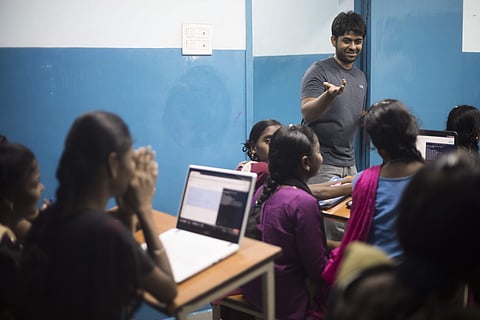

It all started when a friend's daughter, who was on the autism spectrum, asked Manu Sekar to attend a career guidance event for the autistic. There, he met the parents of other autistic children and that got him thinking. "Everyone thinks that people on the spectrum or with any other kind of disability, can only do certain kinds of jobs. They'll be employed by NGOs to make soaps or they'll work in retail. I wanted to give them an alternative choice," says Manu. At the event, he managed to convince four sets of parents to send their kids to his centre, where he teaches coding and web development. Shortly after, he launched HashHackCode, a start-up that trains the differently-abled in coding.
Prior to launching HashHackCode, Manu and his team were already busy training marginalised women in computer programming and hiring them as developers. "This was my first social enterprise and it was called TechDiva. I believe that tech has the ability to break barriers. In tech, more than your degrees or certificates, it's your skillset that matters. While training these women, we were able to explore various teaching methods which could also be used for training the differently-abled," says Manu. While TechDiva is no longer training the women, it has now been transformed into an NGO that addresses the digital divide in the grassroots. "We were able to utilise our TechDiva experience to build HashHackCode and our distinct learning methodologies also helped," explains Manu.
All about that code
Speaking about what he aims to achieve with HashHackCode, Manu says, "Our aim is to create neuro-diversity. Whenever we speak of diversity, we think about gender, culture and so on. No one ever talks about the neurological aspect. We want to create a neuro-diverse workforce by teaching differently-abled coding and enabling them to get better jobs. And to do that, we need to create an education system that focuses on developing their skills. The differently-abled don't have to depend on charity or CSR funding but can be valued for the skills they possess."
In a year, HashHackCode caters to over 45 diff-abled students. And it's not just those on the autism spectrum, the start-up trains those with Down's Syndrome, hearing and speech impairment, learning disabilities, dyslexia and so on. "We have developed a new curriculum called Creative Coding, which is divided into various stages, ten in total. A student learns programming on a platform that has been developed in-house. We teach them programming on HTML, CSS and Java, initially. When they have learnt those properly, they can move on to advanced programming languages like Python," says Manu. The start-up has students as young as eight years old, while the oldest student is 34.
HashHackCode doesn't focus on creating a product through programming. "Instead, our focus is to develop logical and computational thinking among our students," adds Manu, "Programming is a problem-solving process. There are no classroom explanations or lectures. The entire learning process is experiential. Our students are diverse and if they don't like something, they won't do it. It is necessary to cultivate an interest in them and experiential learning really helps." Some of the students who come to HashHackCode even lack basic typing skills, but it is through experiential learning that they slowly develop the ability to code, says Manu. "The Creative Coding curriculum is designed in a way that even someone with very basic computer skills can end up learning how to code as they progress through the levels," adds the 31-year-old.
Dealing with COVID
During the lockdown, HashHackCode also took its classes online. They hired college students and young graduates to train the students. "Post-COVID, we launched a fellowship programme where every month, we select two to four students to teach coding to our students. In addition to our permanent mentors, these students can interact with the differently-abled and encourage peer-to-peer learning," says Manu. After a rigorous selection process, where hundreds of applications are sifted through, only a few get the opportunity to mentor. "Our students have taken to online classes quite well. They are in their own houses and in a comfortable environment. Moreover, seeing someone their own age and learning from them has enhanced their abilities," adds Manu.
Manu also shares the reason why he chose students to train the differently-abled. "When we started out, I didn't know much about neuro-diversity. The intention of hiring young mentors is that when they go and get jobs of their own, they automatically know about these differently-abled people and neuro-diversity. When they see a neuro-diverse individual in their workplace, then it automatically becomes inclusive," says Manu.
The transition to online was surprisingly quite smooth for the students, says Manu. "Even during the physical classes, the students would just sit in front of their computers and code. The methodologies didn't change much — we always focus on one-on-one teaching and instruction is personalised, based on the students' abilities," he adds.
